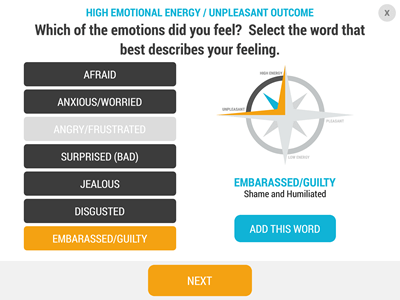Dawn M. Neumann, PhD, is an associate professor of physical medicine and rehabilitation at Indiana University School of Medicine and research director at the Rehabilitation Hospital of Indiana. She studies the challenges survivors of traumatic brain injuries face identifying and regulating their emotions.
Dr. Neumann developed the My Emotional Compass app in collaboration with CreateAbility Concepts, Inc. to help patients relearn their emotional vocabulary and assign names to the emotions they are feeling. We asked Dr. Neumann about her work, the app, and how she hopes it can help survivors of brain injuries.
What is alexithymia?
Alexithymia literally means “without words for emotions.” People with alexithymia typically have trouble processing their emotions. For instance, they may not recognize when they are having an emotional response, or if they do, they may not be able to label or describe their emotions. Differentiating emotions can also be difficult. For instance, they may not know if they are angry, sad, afraid, or feeling some combination of these emotions; they may only know they feel unpleasant.
What is known about why survivors of traumatic brain injuries lose the ability to recognize their own emotions?
The neurological damage after a TBI disrupts parts of the brain and the networks in the brain that are involved in emotional processing, making it more difficult for people to access, experience, label, and understand their emotions.
How common is alexithymia among survivors of traumatic brain injury?
Research indicates a range between 30 and 60 percent compared to approximately 10 percent of people without TBI.
Does this only happen with severe injuries? Or can this happen to people who suffer mild traumatic brain injuries, such as a concussion?
I have only studied alexithymia in moderate to severe injuries, but some research has linked it to mild brain injuries. In fact, findings from one study suggest that people who have alexithymia my take longer to recover from a mild TBI. However, in the mild TBIs (as well as the more moderate and severe) it can be difficult to know if the alexithymia was present before the injury, or developed as a result of the injury.
How might My Emotional Compass help?
My Emotional Compass is a tool to help people find the best words to describe their feelings by navigating them to the most likely options based on their responses to questions. This forces them to pay attention to what they are experiencing and their internal cues (e.g. heart rate), which are important indicators of what emotion they are feeling. While My Emotional Compass can be used by a person on his or her own, it has never been tested without being a part of clinician-guided therapy. It is likely to be most beneficial if introduced to the patient by a clinician and used to facilitate therapy, as well as to monitor progress outside of therapy sessions.
Why did you decide to make this tool into an app?
Several of the subjects who went through my research study and were exposed to a paper version of My Emotional Compass reported how helpful it was and that they would have liked to have easier access to it when out-and-about. The app enables this and makes it a more interactive and guided process than the paper compass. It can be more broadly implemented and utilized as an app.
What’s next for your research related to alexithymia and emotional recognition?
Through our TBI Model Systems grant funded by the National Institute on Independent Living and Rehabilitation Research, we are now conducting a larger trial that is a randomized, wait-list controlled study to examine the efficacy of a full eight-session alexithymia intervention that is a 1:1 guided therapy program between a clinician and a participant. The My Emotional Compass App is an integral component to the treatment.
